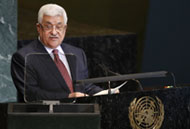
As the diplomatic battle for Palestinian statehood continues, Israelis and Palestinians are still in a deadlock. On July 26, at a U.N. Security Council meeting, the Palestinian position was that U.N. recognition would not hurt the peace talks, but instead it would strengthen efforts for the two-state solution. This statement comes in response to Israel’s position which is that the Palestinians are trying to bypass direct peace talks.
Israel is strongly opposed to the Palestinian bid for statehood and says that direct talks are the only path to peace between the two parties. However, the Palestinians have rejected talks due to Israel’s refusal to renew a settlement moratorium.
The United States, along with Israel, rejects the Palestinian push for full membership at the U.N. and may use its veto power to block the process come September. The Palestinians have yet to decide if they will seek membership in the United Nations as a sovereign state or if they will seek a non-binding resolution that would recognize a Palestinian state, although without U.N. membership.
In a separate meeting on July 29, Israeli Defense Minister Ehud Barak and top leaders in Washington met about defense relations between the two countries. A Pentagon spokesperson stated that during the closed meetings, US Defense Secretary Leon Panetta reinforced America’s “strong commitment” to Israel in terms of defense and to “ensuring that Israel maintains its qualitative military edge”.
Also on July 29, Barak revealed some information about talks between him and UN Secretary General Ban Ki-Moon. Barak stated that his government was working hard to find ways to restart the peace talks. Ban expressed concern over settlement building.
"We are still trying to find a formula that will enable an understanding between the members of the Quartet in a way that will enable a resumption of negotiations," Barak told reporters.
The international Quartet on the Middle East met earlier this month but was unable to agree on a plan that would restart negotiations between Israelis and Palestinians.
On July 27, a senior electoral official stated that Palestinian local elections will be help on October 22, but only in the West Bank. The official suggested that Hamas was blocking efforts for elections in Gaza. Hamas, however, criticized Fatah for not reforming the Central Election Commission under terms of the reconciliation deal that was reached earlier this year. Elections were supposed to have taken place on July 9, but were postponed due to the reconciliation deal.
In local news, settler violence and property destruction continues. On July 27, in the south of Hebron, Palestinian shepherds and international observers were attacked by settlers from the illegal outpost of Havat Maon. The settlers were masked and armed with stones and an iron bar. One international was hit over the head with the iron bar and received eight stitches at the hospital. Peacekeeping groups have documented six occasions where Palestinians and internationals were attacked by settlers from Havat Maon since June 22, 2011.
On July 29, settlers torched olive trees and used live ammunition in the village of Burin, south of Nablus. Witnesses said that the Israeli army prevented fire trucks from reaching the fire, and that settlers shot at the fire trucks that were trying to reach the blaze. Reports stated that clashes broke out between villagers and settlers and the Israeli army fired tear gas, rubber-coated steel bullets, and live ammunition at the Palestinians. An Israeli military spokesperson, however, stated that no live ammunition was used.
On July 26, a lawsuit was filed in Beersheba by Israeli authorities against 34 Negev Bedouins for 1.8 million shekels in damages. They state that this is the cost of having to repeatedly demolish the Bedouin’s “illegal structures”. The authorities claim that the land is state land and the Bedouins are squatters. The Bedouins state that they own hundreds of thousands of dunams but Israel rejects this claim.
Every time the homes are demolished, hundreds of Bedouins and volunteers rebuild. The Bedouins expect compensation for their forced displacement, not the other way around. More than half of the 160,000 Bedouins in Israel live in unrecognized villages with no access to water or electricity. Many live in extreme poverty.
Finally, on July 27, the West Bank city of Jenin was raided by the Israeli army and two employees from the Freedom Theatre were arrested. Witnesses state that stones were hurled at the door of the cultural institution and about 50 Israeli soldiers surrounded the area. The night guard was strip searched and then the two employees were taken to an unknown location at 3:30 in the morning. The Freedom Theater made headlines in April when its general-director, Juliano Mer-Khamis, was shot dead by unknown assailants. The case is still unresolved.







